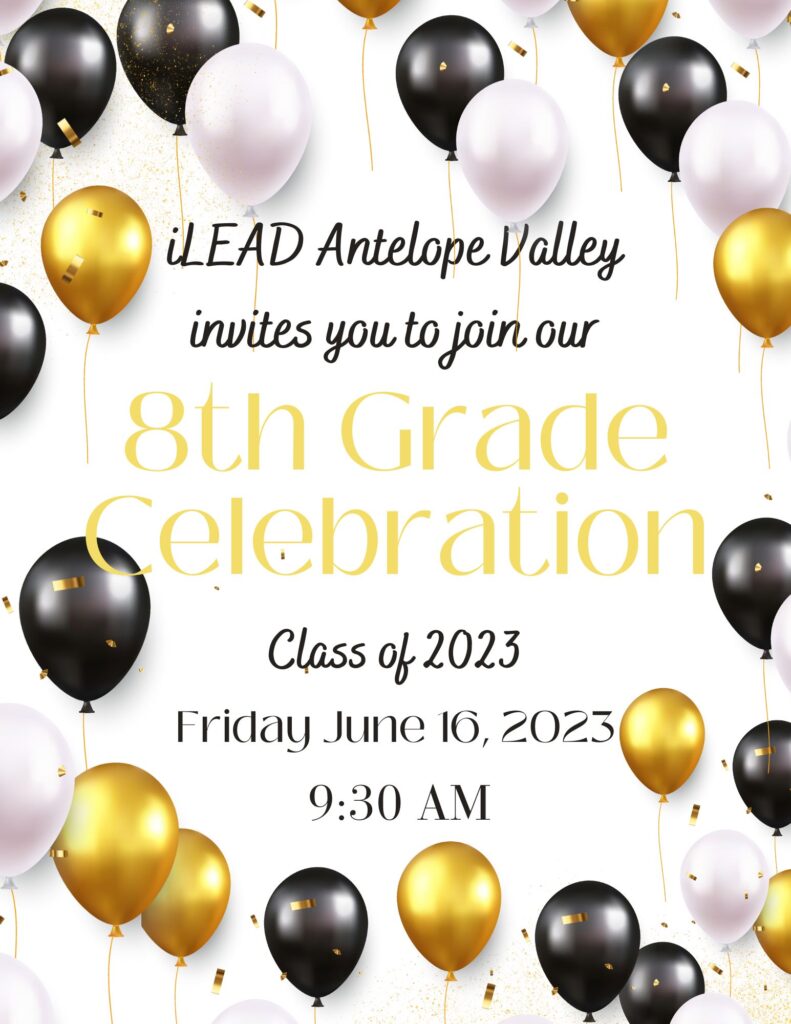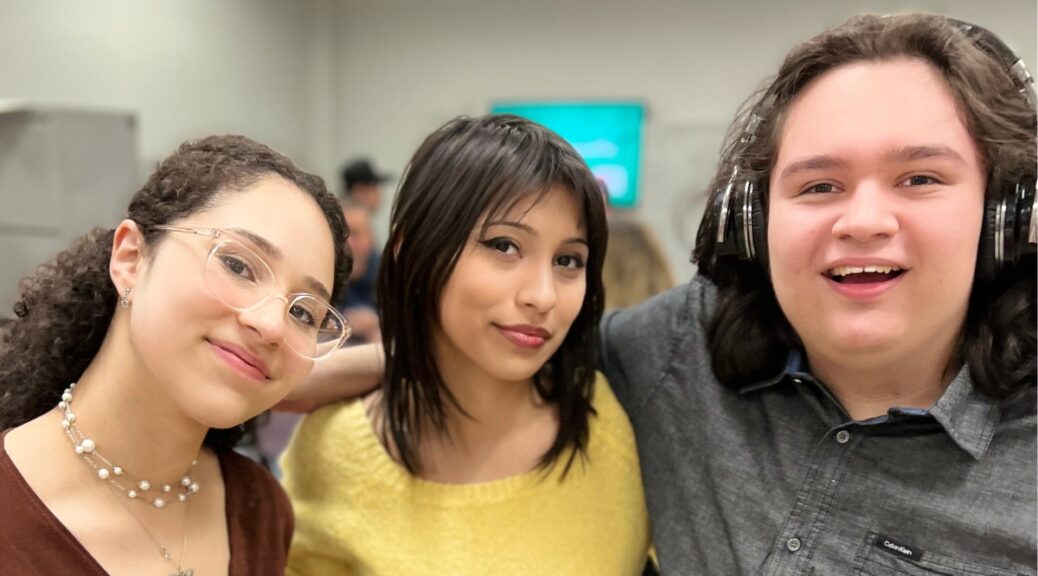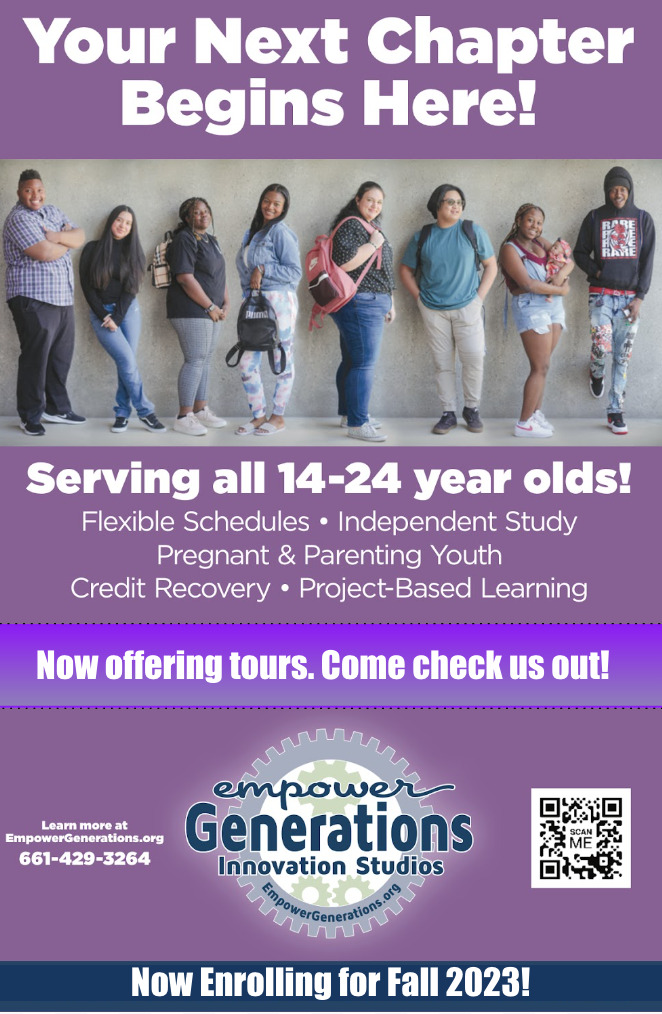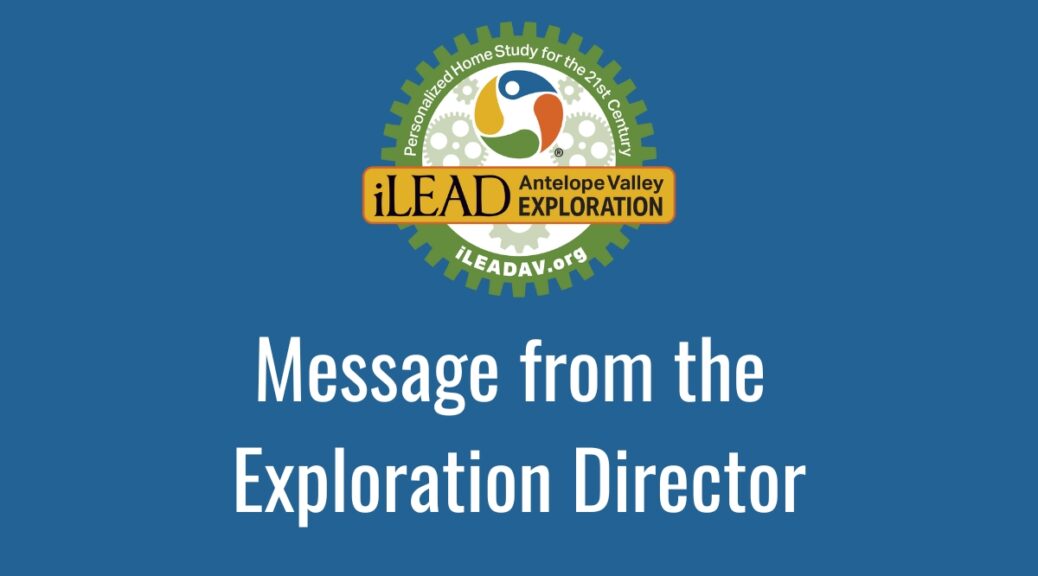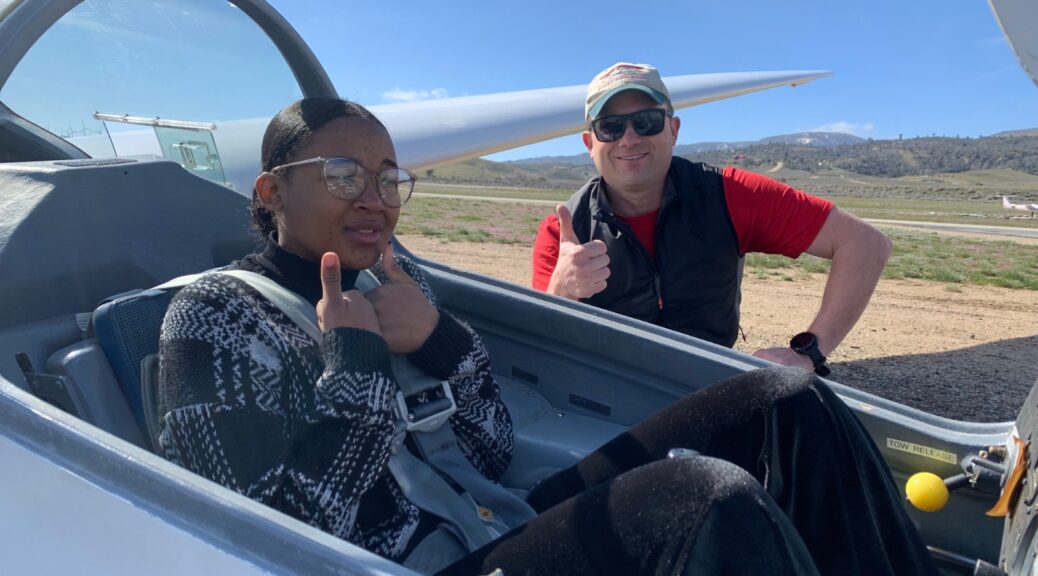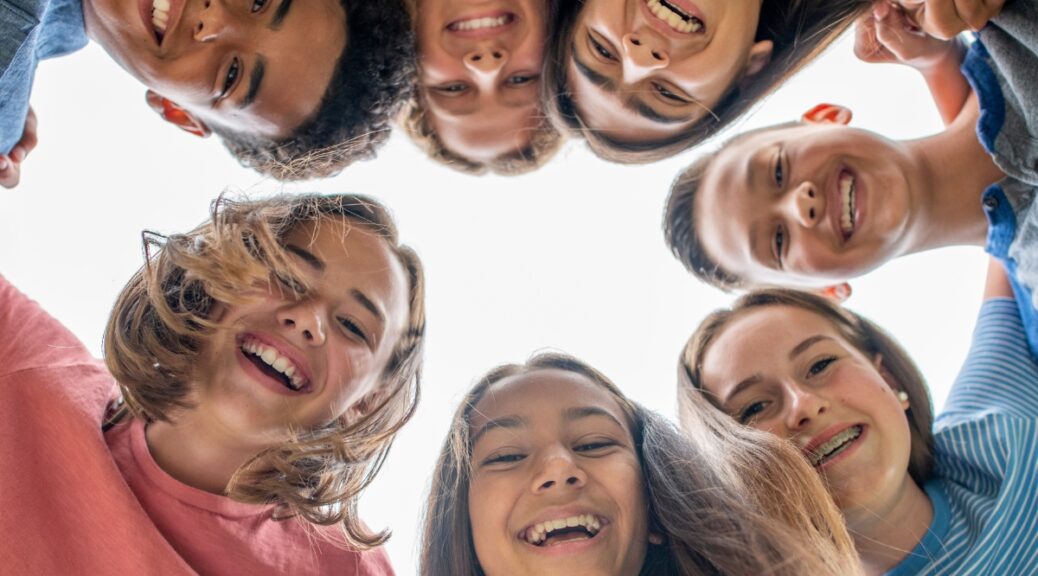You are invited to celebrate our 8th graders as they complete their middle school years! Please join us on Friday, June 16, at 9:30 AM to honor our learners.
Tag Archives: Antelope Valley Charter School
TK/Kindergarten Celebration: June 16
Upcoming Events
Fri., 5/26: 8th Grade Grad Night at Six Flags
Mon., 5/29: Memorial Day – No School
Thur., 6/1 – Fri., 6/9: Learner Showcases
Wed., 6/7: Chuck E. Cheese Fundraiser, 3-9 PM
Fri., 6/9: Donuts with Dads, 9 AM
Tue., 6/13: Backyard Bash, 5-7 PM
Fri., 6/16: 8th Grade Celebration, 9:30 AM
Fri., 6/16: TK/Kindergarten Celebration, 11 AM
Fri., 6/16: Last day of 2022-23 school year
Click here for the school year calendar.
A Note from Empower Generations to Our 8th Grade Families
A message from the team at Empower Generations:
Calling All iLEAD 8th Graders and Families!
It’s time to think about high school registration for 2023-2024!
Your next chapter begins here with us at Empower Generations!
We are now enrolling for next school year and would love to be part of your learner’s high school experience.
We are a tuition-free charter high school with flexible schedules and an independent study program.
If you have any questions, or if you want to come in for a tour, please email Roselia Calderon, call us at 661-429-3264, or fill out our Intent to Enroll.
Save the date for our upcoming events! Everyone is welcome!
Wed., May 24: New Learner/Family Information Night, 5:30-6:30 PM. RSVP HERE.
Message from the iLEAD AV Exploration Director
Dear iLEAD AV Exploration Families,
State testing begins this week for 3rd-8th grade. Please encourage your child to try their best. Let them know there will be some questions they’ll know and some they may not. And that’s OK! If your child is testing at home, you may want to provide a small reward for taking their time and doing their best. If your child is testing at our campus, we will have a reward there.
Thanks again for all your support.
Have a wonderful week!
With gratitude,
Terri Budke
Director of North LA County Exploration
2023-24 Enrollment!
We still have a few spots available for new learners for the 2023-24 school year. Do you know anyone who would benefit from our program next year? Please invite them to come check us out! Let them know we are offering tours on some Tuesdays at 10 AM. They may register here to attend.
Meetup Info
We will be hosting iLEAD AV Exploration meetups for the next several weeks. We hope you and your family are able to attend! Below are the dates and details for our meetups. RSVP here so we can plan ahead. The address for each location is listed on the sign-up sheet. Please don’t hesitate to reach out if you have any questions. We look forward to spending time with you and your families and connecting as a homeschool community!
Thursday, June 1: San Buenaventura Mission, 10 AM
Please join us at the San Buenaventura Mission for a guided tour. Learners will discover mission life and view artifacts and architecture. This is a great opportunity to spend the day in Ventura and end your tour with a quick beach stop and lunch! Please sign up here.
Open House Celebration!
We will hold an Open House on June 7 from 4:30-6:30 PM. Please bring your family and any families who may be considering enrolling at iLEAD Antelope Valley Exploration! We are planning lots of fun things for everyone. We will have hot dogs, Kona Ice (for purchase), crafts, water games, eight vendors from our vendor list, and more!
We are asking for donations of single-sized chips and water bottles. If you can supply some, please bring them to our classroom on a Wednesday between 8:30 AM and 4:30 PM, and AdrieAnna will assist you.
Kindergarten and Eighth Grade Promotions!
Mark your calendars for our K and 8th grade promotions! You won’t want to miss this special event on Thursday, June 8, in our classroom.
- Kindergarten: 10:00-11:00 AM
- 8th Grade: 11:30 AM-12:30 PM
Curriculum Return Week
Curriculum return week will be held the week of June 12. Your EF will contact you with a sign-up sheet. Please start locating items from the beginning of the year, if needed. Please return all items. A partly used workbook is still good to have on hand in case a child enrolls late or we need some work for workshop time.
Upcoming Events
Mon.-Fri., 5/15-19: State Testing, 3rd – 8th grades, in person
Mon.-Fri., 5/22-26: State Testing, 3rd – 5th grades, virtual
Mon., 5/29: Memorial Day – No School
Thur., 6/1: Meetup at San Buenaventura Mission, 211 E Main St., Ventura, CA
Wed., 6/7: Open House, 4:30-6:30 PM
Thur., 6/8: Kindergarten Promotion, 10 – 11 AM
Thur., 6/8: 8th Grade Promotion, 11:30 AM-12:30 PM
Mon., 6/12: LP Week
Mon.-Fri., 6/12-16: Curriculum Return Week
Fri., 6/16: Last Day of 2022-23 School Year
Intro to Piloting Course Info Meeting: May 18
Our 8th graders and their families are invited to an informational meeting about an upcoming Intro to Piloting Course. Please see the flyer below for details, and register here. (Interested 7th graders are also welcome to attend!)
Virtual Parent Night: Facts About Substance Abuse: May 18
iLEAD California Presents: Virtual Parent Night: Facts About Substance Abuse on Thursday, May 18 from 6:30 to 8:00 PM. Join us on Zoom. Send us your questions about substance use.
Upcoming Events
Fri., 5/26: 8th Grade Grad Night at Six Flags
Mon., 5/29: Memorial Day – No School
Thur., 6/1: 9th Grade Learner Showcases
Wed., 6/7: Chuck E. Cheese Fundraiser, 3-9 PM
Fri., 6/9: Donuts with Dads, 9 AM
Tue., 6/13: Backyard Bash, 5-7 PM
Thur., 6/15: Learners’ Last Day on Campus
Fri., 6/16: 8th Grade Celebration, 9:30 AM
Fri., 6/16: TK/Kindergarten Celebration, 11 AM
Fri., 6/16: Last day of 2022-23 school year
Click here for the school year calendar.
A Note from Empower Generations to Our 8th Grade Families
A message from the team at Empower Generations:
Calling All iLEAD 8th Graders and Families!
It’s time to think about high school registration for 2023-2024!
Your next chapter begins here with us at Empower Generations!
We are now enrolling for next school year and would love to be part of your learner’s high school experience.
We are a tuition-free charter high school with flexible schedules and an independent study program.
If you have any questions, or if you want to come in for a tour, please email Roselia Calderon, call us at 661-429-3264, or fill out our Intent to Enroll.
Save the date for our upcoming events! Everyone is welcome!
Wed., May 24: New Learner/Family Information Night, 5:30-6:30 PM. RSVP HERE.
Message from the iLEAD AV Exploration Director
Dear iLEAD AV Exploration Families,
This week marks the end of LP 8! Please be sure your learner has completed their assigned work. Remember: In independent study/home study, attendance is granted through the completion of the body of assigned work. We want to make sure your learner is earning their full attendance for the LP.
Next week, May 15, we will begin our CAASPP State Testing. Learners in 3rd grade and up all participate in this yearly assessment. Please let your EF know if you would like your child to test in person or virtually. In-person testing will take place in our classroom May 15-18. Virtual testing will be held May 22-26. Thank you for ensuring your child is registered for their tests. Our goal is 100% participation in order to meet state requirements. Kiddos who come to our classroom to test will get some extra-special treats during testing.
Thanks again for all your support.
Have a wonderful week!
With gratitude,
Terri Budke
Director of North LA County Exploration
2023-24 Enrollment!
We still have a few spots available for new learners for the 2023-24 school year. Do you know anyone who would benefit from our program next year? Please invite them to come check us out! Let them know we are offering tours on some Tuesday at 10 AM. They may register here to attend.
Meetup Info
We will be hosting iLEAD AV Exploration meetups for the next several weeks. We hope you and your family are able to attend! Below are the dates and details for our meetups. RSVP here so we can plan ahead. The address for each location is listed on the sign-up sheet. Please don’t hesitate to reach out if you have any questions. We look forward to spending time with you and your families and connecting as a homeschool community!
Tuesday, May 9: AV Rural Museum at 10 AM
The purpose of the Antelope Valley Rural Museum is to develop a permanent historical museum for the citizens of the Antelope Valley by collecting, preserving, restoring, exhibiting, and researching facts and artifacts pertinent to its history.
This is a perfect trip, especially for 3rd graders to help them meet their local history standard. All learners are welcome to come learn about the history of the Antelope Valley through preserved artifacts and with the guidance of an experienced docent.
Thursday, June 1: Mission San Buenaventura Meetup 10 AM
More information to come!
Kindergarten and Eighth Grade Promotions!
Mark your calendars for our K and 8th grade promotions! You won’t want to miss this special event on Thursday, June 8, in our classroom.
- Kindergarten: 10:00-11:00 AM
- 8th Grade: 11:30 AM-12:30 PM
Curriculum Return Week
Curriculum return week will be held the week of June 12. Your EF will contact you with a sign-up sheet. Please start locating items from the beginning of the year, if needed. Please return all items. A partly used workbook is still good to have on hand in case a child enrolls late or we need some work for workshop time.
Upcoming Events
Mon., 5/8: Teacher Appreciation Week & LP Meeting Week
Tues., 5/9: Antelope Valley Rural Museum Meetup, 2551-2713 W Avenue H, Lancaster (Fairgrounds), 10-11 AM
Mon.-Fri., 5/15-19: State Testing, 3rd – 8th grades, in person
Mon.-Fri., 5/22-26: State Testing, 3rd – 5th grades, virtual
Mon., 5/29: Memorial Day – No School
Thur., 6/1: Meetup at Mission San Buenaventura, 211 E Main St, Ventura, CA
Wed., 6/7: Open House, 4:30-6:30 PM
Thur., 6/8: Kindergarten Promotion, 10 – 11 AM
Thur., 6/8: 8th Grade Promotion, 11:30 AM-12:30 PM
Mon., 6/12: LP Week
Mon.-Fri., 6/12-16: Curriculum Return Week
Fri., 6/16: Last Day of 2022-23 School Year



